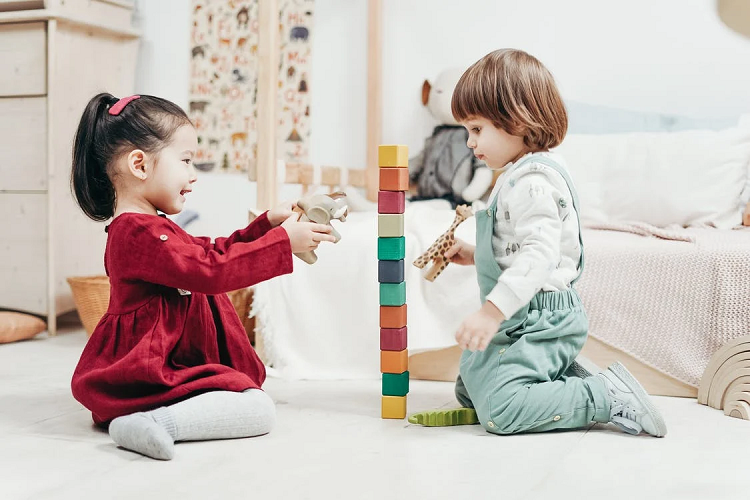As many parents have busy working schedules these days, enrolling children in preschool has become more and more popular. A preschool is a good way to introduce your child to the education system. Even though it might not seem so to many parents, the choice of preschool with the right programs does matter a lot. The preschool period is considered to be the prime time when children start to develop in every aspect. And this base dictates how they will be in the future. Enrolling your child in the right preschool has plenty of benefits.
What are the benefits of preschool education for kids?
Some of the benefits of preschool include teaching children to follow directions, providing social and emotional development, and helping children adjust to kindergarten. Other benefits of preschool include great opportunities for play, encouraging physical development, and contributing to education equality. Moreover, children learn many useful things. They learn compassion skills, develop their language skills, acquire motor skills, socialize and share. Preschool is genuinely important for the overall development of children.
Follow directions
One of the most important things a child needs to learn at this early age is to follow directions. Sometimes it is more effective for parents to do this in combination with a third-party authority figure, such as a preschool teacher. It is necessary for children to learn to follow directions as it is a skill that is implied in kindergarten and school. Children who don’t know to follow directions often have a difficult time adjusting to and accepting these implied rules.
For parents, it is frustrating to repeat themselves over and over again, while their child completely ignores them. Learning how to follow directions is a skill that children master over time. And preschool definitely helps make it faster. Teachers start with some basic directions such as lining up and washing hands. In this way, children learn to view adults as authority figures.
Social and emotional development
Preschool is not as focused on academic skills as it is on social and emotional skills. These skills include a variety of emotions and behaviors. For instance, children learn how to take turns and share things. They also learn how to control their strong emotions. Moreover, they learn how to show empathy for their classmates. These skills are essential for further academic development. Without them, children will have a hard time adjusting and advancing.
Preschool is thus a safe yet challenging environment, perfect for children in development. By learning to sit and listen quietly to a short story their teacher is sharing with them, children explore different feelings. They create a base for self-regulation. This is a sensitive period for children, in which they absorb and acquire skills for life.
Adjust to kindergarten
Children can have a hard time adjusting to kindergarten. That’s why a preschool is a great way to slowly start introducing the whole schooling system. It will be easier both for you and your children to start this transition casually and without a rush. You should do it slowly, at a pace that works for your child. That’s why this is often done in a specific way, especially with children who are attached to their parents and don’t like new people.
If that is the case with you and your child, you should start by going there are spending an hour or two together with your child. Then, when they are somewhat familiar with the palace, you should start by leaving them there for a few hours only. And then finally, when they feel comfortable going there without you, you should leave them full-time.
Opportunities for play
Moreover, preschool provides your child with plenty of opportunities for play. First of all, there are other children, so socializing is emphasized. There are plenty of toys, both educational and intended for free play. Children learn how to play with all kinds of toys as well as with other children. You can’t provide all these conditions at home.
Of course, you can get them toys, but a huge difference is in other children who are there. Also, the activities are teacher-guided and controlled. All of them have some educational or learning purpose. Through these activities, teachers teach children various essential skills. The preschool programs are specially developed by teams of experts and intended to shape children into educated individuals.
Physical development
Children’s physical development is directly related to their learning abilities. One important segment of physical development is motor skills. There are two types: overall or gross and fine motor skills. Overall motor skills include the children’s general ability to coordinate themselves and balance. These are whole-body movements. On the other hand, fine motor skills are skills that allow kids to hold a pencil and learn to write.
A preschool environment is ideal for kids to make progress when it comes to acquiring these key skills. Also, children get a lot of outdoor free play, where they also acquire a lot of gross motor skills with climbing, jumping and swinging. It helps children establish a mind-body connection as well as boost their self-confidence.
Education equality
Preschool also gives children something that they can’t get from their family: it teaches them equality. Children spend time with other, different children in preschool. There is a combination of both genders, several races as well as different financial statuses.
High-quality preschool can thus be seen as a key to education equality. Children who don’t attend preschool start kindergarten at a considerable disadvantage in terms of academic and social-emotional skills.
For some children, it can be a trap in the form of a vicious cycle of constant catching-up and learning. And it can be frustrating. However, not all preschool institutions are publicly funded, so not everyone can afford sending their child off to a preschool. Nevertheless, hopefully, this will change and preschool will be readily available for everyone.
Learn compassion skills
Being compassionate is one of the skills children learn at this early age. And one of the sure and fast ways for them to learn to be compassionate is in preschool. Children get to know other kids through compassion. It enables them to level with tier peers. Through different activities and behaviors with their peers, they deduce different things.
Compassion is one of the skills that children definitely need to learn at an early age. By attending preschool, children can observe other kids at their worst and best. They interact with each other and learn things from those interactions. This is how the children learn compassion best.
Develop language skills
Some children start talking early, while others start a bit late. Some talk a lot, while others use words sparingly. Regardless of these differences and how developed your child’s language skills are, attending preschool is definitely going to boost their vocabulary. Preschool is an excellent way for children to build on their basic language skills.
A preschool featuring a quality program can mean a lot for the linguistic development of children and they can come out of it with a full vocabulary. You can even look at the preschool as a head start. Certain activities in preschool aim to teach them to listen carefully as we ll as to speak and use their words.
Besides learning their mother tongue, many preschools also offer the possibility of learning a second language such as English, German, French or Spanish.
Acquire motor skills
As we already briefly mentioned in some of the previous paragraphs, preschool is where children acquire motor skills. Besides the ones we already mentioned, children also learn to zip their jackets, put on and tie their shoes, tell the time and so on.
A good preschool class will teach your child all these basic life skills that are necessary for further academic development. When they master motor skills, that means they mastered using their fingers. They do that through many amusing and challenging activities.
Kids learn to draw and cut specific shapes, glue them as well as make things with their hands. They also need to spot different items, color some things while staying inside the lines, and do other things. Children also develop their logical, mathematical, problem-solving, musical and spatial skills.
Learn how to socialize and share
Another huge benefit of children attending preschool is the fact that they learn to socialize and share. Children learn to interact with other kids by going to preschool. And this is the skill they will need and use throughout their whole life.
For many children, learning how to socialize is challenging, so preschool is the ideal way to help them through that. As you are familiar with this already, young children aren’t so much into sharing things they see as theirs. In preschool, however, they learn to share toys and take turns. Preschool will not only teach them to share, but it will also teach them to understand the importance of sharing.
If you have the possibility to enroll your child in preschool, do it by all means. They will reap plenty of benefits they can use throughout their whole life.
Jess Cooper is a part-time journalist and blogger based in Sydney, Australia. She is an energetic, creative, highly motivated person with plenty of interests. The most prominent areas of interest include business, fashion, marketing, communications, real estate, and lifestyle. She enjoys giving business advice on startups, and she loves covering the topic of fashion, offering stylistic advice as well as where to find adorable skirt and blazer sets, evening gowns and formal clothing for different occasions.




